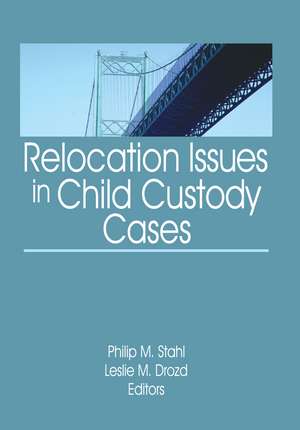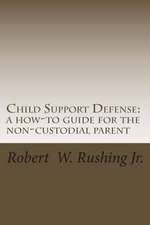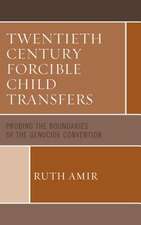Relocation Issues in Child Custody Cases
Editat de Philip M. Stahl, Leslie M. Drozden Limba Engleză Hardback – 22 ian 2007
In the past, the relocation of a parent or child in custody cases was rarely a problem for divorced families—there was little conflict and little need for court intervention. But with the growth of shared custody, more fathers involved in parenting after divorce, and an increase in litigation between conflicted parents, relocation has become a complex issue that’s difficult for evaluators, judges, and public policymakers to resolve. Relocation Issues in Child Custody Cases offers a firsthand look at how evaluators investigate, predict, and make recommendations; how judges reach decisions based on those recommendations; and how individual states deal with relocation cases.
Relocation Issues in Child Custody Cases examines how evaluators, mediators, and judges can best facilitate an environment where a child has an ongoing relationship with two parents, regardless of where each parent lives. This unique book looks at how the landscape in relocation cases has changed since the California Supreme Court’s landmark 2004 ruling in the LaMusga move-away case, examining relevant topics, including individual state statutes on relocation; a survey of courts in the United States; the functions of an evaluator; how a judge analyzes data before reaching a decision; parental conflict; domestic violence; change of circumstances; primary residence; and the process of developing parenting plans.
Relocation Issues in Child Custody Cases examines:
- whether negative outcomes of parental relocation after divorce were a result of pre-existing conflict and domestic violence
- whether the “best interests of the child” is an acceptable standard in relocation cases
- investigative models for evaluators
- “for the move” and “against the move” biases—and how to reduce them
- a format for analyzing evidence in relocation cases
- the risks and benefits of presumptions in family law matters
- and much more
| Toate formatele și edițiile | Preț | Express |
|---|---|---|
| Paperback (1) | 315.47 lei 6-8 săpt. | |
| Taylor & Francis – 8 ian 2007 | 315.47 lei 6-8 săpt. | |
| Hardback (1) | 1099.40 lei 6-8 săpt. | |
| Taylor & Francis – 22 ian 2007 | 1099.40 lei 6-8 săpt. |
Preț: 1099.40 lei
Preț vechi: 1748.79 lei
-37% Nou
Puncte Express: 1649
Preț estimativ în valută:
210.38€ • 224.96$ • 175.40£
210.38€ • 224.96$ • 175.40£
Carte tipărită la comandă
Livrare economică 17 aprilie-01 mai
Preluare comenzi: 021 569.72.76
Specificații
ISBN-13: 9780789035332
ISBN-10: 0789035332
Pagini: 194
Dimensiuni: 156 x 216 x 18 mm
Greutate: 0.52 kg
Ediția:1
Editura: Taylor & Francis
Colecția Routledge
Locul publicării:Oxford, United Kingdom
ISBN-10: 0789035332
Pagini: 194
Dimensiuni: 156 x 216 x 18 mm
Greutate: 0.52 kg
Ediția:1
Editura: Taylor & Francis
Colecția Routledge
Locul publicării:Oxford, United Kingdom
Cuprins
- INTRODUCTION
- Introduction to the Volume on Relocation Issues in Child Custody Cases (Philip M. Stahl)
- Relocation, Parent Conflict, and Domestic Violence: Independent Risk Factors for Children of Divorce (William V. Fabricius and Sanford L. Braver)
- A Move in the Right Direction? Best Interests of the Child Emerging as the Standard for Relocation Cases (Linda D. Elrod)
- Exploring Three Functions in Child Custody Evaluation for the Relocation Case: Prediction, Investigation, and Making Recommendations for a Long-Distance Parenting Plan (William G. Austin and Jonathan W. Gould)
- Avoiding Bias in Relocation Cases (Philip M. Stahl)
- Relocation Cases: Analyzing Relevant Evidence (Martha Ann Lott)
- The Problem with Presumptions—A Review and Commentary (Lyn R. Greenberg, Dianna J. Gould-Saltman, and Robert Schnider)
- CONCLUSION
- Index
- Reference Notes Included
Notă biografică
Philip M. Stahl, Leslie M. Drozd
Descriere
In the past, the relocation of a parent or child in custody cases was rarely a problem for divorced families—there was little conflict and little need for court intervention. But with the growth of shared custody, more fathers involved in parenting after divorce, and an increase in litigation between conflicted parents, relocation has become a complex issue that's difficult for evaluators, judges, and public policymakers to resolve. Relocation Issues in Child Custody Cases offers a firsthand look at how evaluators investigate, predict, and make recommendations; how judges reach decisions based on those recommendations; and how individual states deal with relocation cases.









